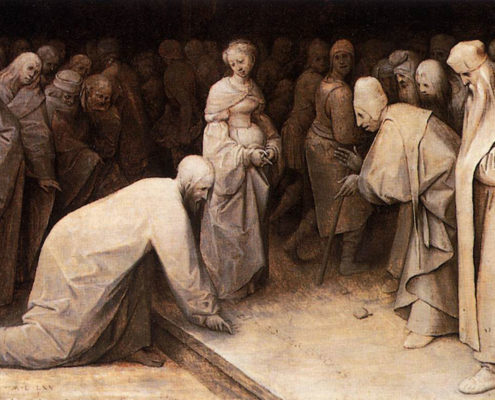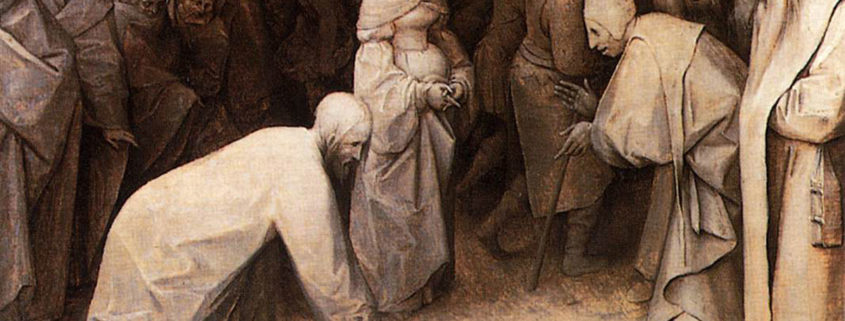
A reflection for Ash Wednesday
“Blessed are the merciful”, says Jesus, “for they shall receive mercy” (Matthew 5.7).
“Mercy is the very foundation of the church’s life” writes Pope Francis (Amoris Laetitia, 310)
I want to encourage you to journey through Lent with today’s gospel reading from John 8. It’s almost always described as the story of the woman caught in adultery. But it should also be described as the story of the scribes caught in harsh judgement. Best of all, it is the story of the Saviour who is shaped by mercy. The tensions in the story lead us through Lent to the drama of the passion and the meaning of Christ’s death.
So keep the story in mind as you travel through the next forty days. Read it often and find yourself, as it were, in the three different characters and discover the three different characters in you.
The context is important. Jesus is sitting and teaching in the temple. He is in the place of judgement, a priest and a king. The king is to be both judge and saviour. What kind of wisdom does he have when faced with an impossible dilemma? Will he be like Solomon, able to offer a way forward in this terrible impasse? Or will he fail the test?
Reflect first on the scribes and the Pharisees. They are at their most unattractive here. Cruel, harsh, judgemental, lacking in that foundational quality of mercy. They publicly shame a woman in public, display her as an object for spectacle and scrutiny to make a broader, wider point. Their aim is to test, to divide. In the name of purity and holiness and rules, they have forgotten how to love. Their zeal leads them to demand blood and death. They want to test Jesus, the Son of God, and therefore to test God himself against his own laws.
We are meant to recognise ourselves in the scribes, I think, here and elsewhere in the gospels. Our worst selves, of course. The part of us which enjoys nothing more than to judge others and especially other Christians. The part of us which continually strives to divide Christ’s body. The part of us which listens to rumour and gossip. The part of us which constantly seeks the high ground, the superior place, from which to rain down rocks on others.
If you cannot see your inner Pharisee when you look into the mirror then you are blind and you have not yet looked hard enough. Take time in Lent for self-examination, for confession, for reflection, on your desire to feel and to be superior, to others, to judge, to displace God from the mercy seat. Take time to realise the consequence of your unchecked zeal in the lives of others. Put down the rocks you are so ready to throw and slip quietly away and seek the mercy you so desperately need.
For most of us, that will take at least a couple of weeks of Lent, perhaps longer. When we can see ourselves more clearly and accurately in the mirror, when we see the hatred in our faces and hear the harshness in our voice and the rocks in our hands, then we are are ready to reflect on the woman who is brought before Jesus. Taken in sin, as we are. Deeply uncomfortable in the light of day, as we are. Ashamed as we are. Seeing all too clearly the wrong turnings. Expecting nothing but condemnation, injury and death. We are ready to stand far off and scarcely raise our eyes to heaven and say: God be merciful to me, a sinner.
We find ourselves in the woman and this woman in us. The woman’s journey in the story is to move from the shame she feels in her actions to new beginnings, from the harsh gaze of the Pharisees to the gentle gaze of Jesus; to move from the condemnation of the scribes to the silence and stillness of the Saviour; to move from death and judgement to new life and new beginnings.
The central task of Lent is to recover mercy rather than judgement as the heart of our understanding of God. It is all too easy to live with an image of God who is like the Pharisees: who is far more ready to condemn than to forgive. To live in this story for a while is to see those harsh images of God dissolve and give way to Jesus, crouching in the dust, silent. To hear him dismiss our accusers and hear them turn away one by one, dropping the stones they have brought in to throw at us. To be left face to face with Christ.
To hear his words to us: Neither do I condemn you. Neither do I condemn you. Go on your way and from now on do not sin again.
The story of the woman might bring us through Lent to Passiontide. But the gospel passage has still more truth to teach us. For we are left with a tension, a dilemma, in which mercy has prevailed over judgement in this scene. Mercy has prevailed in a way which we recognise as deeply authentic. This is the God we recognise through our tears, as it were, God for the weak and despised, God who subverts. But how is it possible for God to raise us up, to set us free, to pronounce us forgiven and called to holiness and to share this work of mercy?
The gospel reveals to us that this reconciliation, this work of grace, is not possible without the cross. We are continually tempted to write the cross out of our understanding of faith: to recude the gospel to something we do or learn or teach. This tension between judgement and mercy leads in the gospel inexorably to the passion. These hands which let go of their stones will pick them up again not to kill this woman but to kill the one who sets her free.
The one who kneels and draws in the dust and speaks words of mercy will give his life for this woman and for us all. His life is offered, yes, as a demonstration of God’s love but far more than that. Our words and our understanding struggle to grasp and comprehend the meaning of the cross. He gave there by his one oblation of himself, once offered, a full, perfect and sufficient sacrifice, oblation and satisfaction for the sins of the whole world.
Jesus makes his journey to the cross to complete a task, to accomplish the salvation of the world, to offer through his death freedom and a new beginning. His words to this woman and to the scribes anticipate his death. They are a profound reworking of religion and power and life. They flow from the meaning of his death which gives life to the whole world.
This is the gospel we are offered and which we bear. We are released from our compulsive need to condemn and judge others and set free to love. We are released from our shame and guilt and set free to live. We are called to service in the pattern of Jesus. Mercy is the very foundation of the Church’s life.
Blessed are the merciful for they will obtain mercy.
A sermon at Ripon College Cuddesdon
Ash Wednesday, 2017
John 8.1-11

